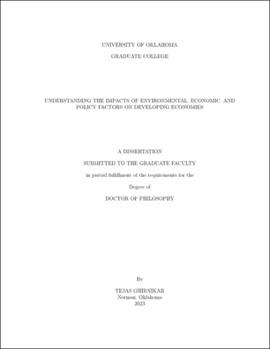| dc.description.abstract | The first chapter of this dissertation studies the long-term effects of climate conditions during an individual's birth year on their life cycle. Drawing on data from the India Human Development Survey and monthly rainfall data from the Global Historical Climatology Network, the study focuses on adults born between 1965 and 1978. The analysis reveals that higher rainfall levels during the birth year are associated with improved socioeconomic outcomes in an individual's health, schooling, and income over time. However, the presence of birth-year rainfall volatility has a contrasting negative impact, with men experiencing a stronger effect compared to women due to pre-existing gender inequality in India. Notably, regions relying on rice farming show heightened susceptibility to the influence of rainfall on health and schooling during adulthood. These findings underscore the significance of early-life climate conditions, particularly the importance of adequate nutrition during infancy, in shaping an individual's long-term well-being. In the second chapter, we delve into the evaluation of the IMF's Structural Adjustment Programs (SAP) and their impact on the IMF's yearly growth predictions for member countries. The analysis centers on a dataset consisting of 158 countries during the period from 1990 to 2004. The Structural Adjustment Programs were implemented by the IMF in the early 1980s and required member countries to fulfill specific conditions to receive loan tranches. We find that the IMF tends to overestimate future growth in countries subjected to a higher number of SAP conditions. This research sheds light on the IMF's perception of SAP allocation and its implications for a country's future growth. The effectiveness of SAP remains a contentious topic, and these findings contribute valuable insights into how these programs may impact a country's economic prospects. In the third chapter, the impact of China's Cleaner Production Law on firm behavior and long-term investment decisions is studied using a Synthetic Difference-in-Differences (SDID) framework. We focus on the role of county governments' environmental budgets in shaping firms' investment decisions, highlighting the importance of effective monitoring mechanisms. Although the implementation of environmental laws resulted in changes in firm behavior, we did not find statistically significant reductions in pollution levels after the implementation of the law. This is owing to the fact that pollution levels are affected by multiple variables apart from manufacturing activities. We also run a battery of sensitivity tests to check the validity of our results and find that the main results are consistent across various frameworks. | en_US |
